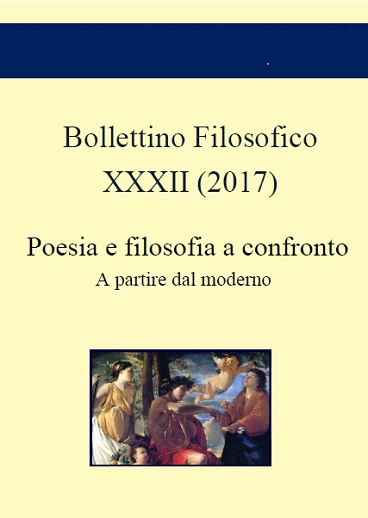Vol. 32 (2017): Poetry and philosophy compared. Starting from the modern

Of all philosophical issues, the question of the connection between poetry and philosophy is the one that puts both terms back into play in a particularly productive way.
The philosophical gaze passes through poetry and, starting from here, develops a discourse where the word is examined in its historical and temporal role, in order to once again give philosophical thought the instrument which it needs but which it cannot find within the limits of its own argumentations.
However, philosophical and poetic words cannot be subordinated one to another, but have to stand in mutual trust and knowledge, attempting to understand reality, in spite of the different attitudes and points of view on it.
Therefore, the point in question will be the sense of a word which is frequented both by poetry and philosophy but is transfigured by the poetic filter, changing itself due to the enigmatic transformation process to which it is subjected.
Philosophy has frequently tried to position poetry within a general context, betraying in this manner its usual theoretical and conceptual hegemony. Maybe it is time to let prevail once again a position of philosophical listening to the poetic word, allowing poetry to offer philosophy what it wants to and can give to it.
If we return to the question of the relation between philosophy and poetry, we return also to the question of the relation between the poet and the philosopher. Romanticism was the age when poetry had a privileged place in philosophical reflection, to the point that the figure of poet-philosopher was often identified with the figure of philosopher-poet. In the following decades, and during the twentieth century, while the problems and methods of philosophy were changing, an analogous change in the form and contents of poetry occurred, creating a language modality able to make the expression of thought possible.
We can shed new light on a transformed, but never effectively interrupted, relation, investigating some phases and the historical and theoretical moments experienced by the thinkers and poets of our time.
Moreover, to disclose the unexplored horizons of the thinkers-poets of our history would mean an increase in the potentiality of philosophical reflection, since poetry also made use of philosophy when it showed similarities which had been kept hidden by a distance in language.
The challenge lies in attempting to show them in a new light, both retracing the plot of some exemplary poetic moments, and reconsidering some original tracks in the history of thought.
